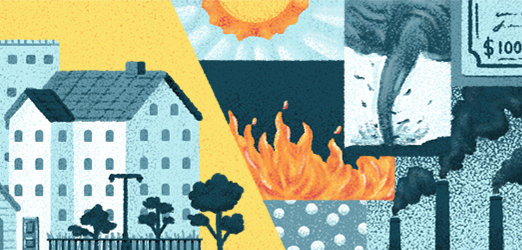Shared Fates
A Housing Resilience Policy Vision for the Home Insurance Crisis
Every year, more people across the United States experience climate disasters, forcing them to leave their homes, lose their belongings, and be separated from jobs and family. Meanwhile, home insurance markets are in a mounting crisis–and leaving people across the country behind. Media and policy makers are attuned to this crisis, but most are not offering analysis and solutions that address the core issue: how we ensure safe, accessible, and affordable housing in a time of increasing climate change-driven disasters.
Our new research, Shared Fates: A Housing Resilience Policy Vision for the Home Insurance Crisis,
- outlines overlaps in insurance prices, housing costs, climate risk, and socioeconomic factors at national and state levels;
- provides critical analysis of prevailing industry narratives; and
- offers a comprehensive policy proposal that aims to provide protections for homeowners and renters, meet the moment of a rapidly changing climate, and contribute to climate solutions rather than to the climate crisis.
Our analysis dives into three state case studies in California, Florida, and Minnesota, yet finds that no state is truly risk free in a climate-changed future. We find that:
- Today’s insurance crisis is a housing justice issue, impacting people unequally along social lines. Renters, for example, are increasingly saddled with insurance driven-housing cost increases. In some Florida counties, homeowners are paying over 5% of their income on home insurance.
- People across the country are at risk of significant loss from multiple hazards. Almost 40% of people in the US are living in areas at high risk of property damage and destruction–including in the upper Plains and Southeast–and that risk is racialized. Communities of color, especially American Indians and Alaska Natives, disproportionately face multiple threats.
- Insurance price increases are stymying efforts to build more and greener affordable housing, further exacerbating housing affordability and availability issues.
- Instead of prioritizing protection of people’s homes, private insurers engage in speculative maneuvers to secure profit, often facilitated by regulators. Even some public pension funds are engaging in these speculative investments: we found over two dozen public pension funds invested in nearly $1.3 billion in risky insurance-linked securities.
- Narratives undergirding the current home insurance system in the US lack effectiveness and equity. Risk-based pricing does not effectively reduce risk and causes unacceptable inequities, and existing public insurance programs are floundering because of design flaws – not because public insurance can’t work.
Our research provides a transformative policy path out of this crisis.
The Solution
We propose the creation of Housing Resilience Agencies (HRAs), either by states or the federal government. HRAs would:
- Provide public disaster insurance that offers fair and equitable protections
- Coordinate and oversee comprehensive, community-oriented disaster risk reduction
- Address existing market failures by providing coverage for oft-neglected sectors such as multi-family housing providers, mobile home dwellers, and heirs properties
- Host public risk models, climate risk advisory councils, and diverse governing boards to inform decision-making in a transparent and democratic manner
In order to confront the growing housing safety and affordability crisis, we need to understand our fates as shared. We must reimagine our home insurance system for it to reduce risk and provide equitable and fair protection.
Contact: Ruthy Gourevitch, rgourevitch@climateandcommunity.org
Meet the authors

Moira Birss

Michael Esposito
University of Minnesota

Nick Graetz
University of Minnesota

Sarah Knuth
Geography,
Durham University

Sage Ponder
Geography,
Florida State University

Zac Taylor
Delft University of Technology
